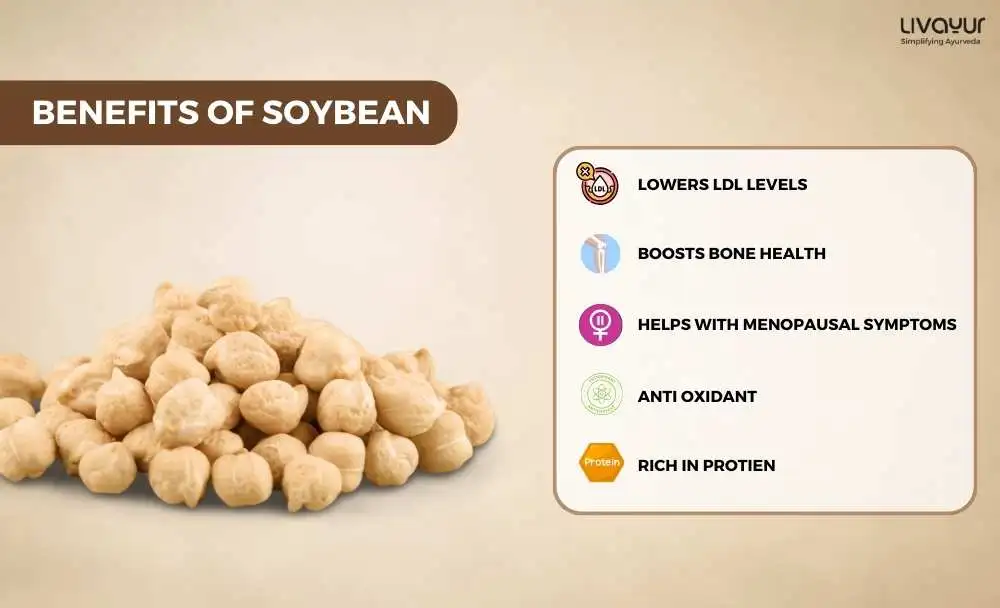
Soybeans are a type of legume consumed in Asia for thousands of years. [3] Soybeans are known for their high protein content and are a great source of several essential nutrients. In this article, we will discuss the various soybean nutrition facts, soybean recipes, and the soybean benefits and side effects. Read on to learn more:
Soybean nutritional value chart [1]
Soybeans are a rich source of plant-based protein, fiber, and several essential vitamins and minerals. According to the United States Department of Agriculture (USDA), 100 grams of soybeans (cooked) contain a generous amount of vital nutrients. The table below shows the nutritional value of soybean.
| Nutrients | Value |
| Calories | 173 Kcal |
| Carbohydrates | 9.9 grams |
| Fat | 9 grams |
| Proteins | 16.6 grams |
| Fiber | 6 grams |
| Iron | 2.2 milligrams |
| Calcium | 88 milligrams |
| Magnesium | 70 milligrams |
| Potassium | 515 milligrams |
| Sodium | 2 milligrams |
| Phosphorus | 194 milligrams |
| Zinc | 1.5 milligrams |
| Copper | 0.4 milligrams |
| Selenium | 2.5 microgram |
| Manganese | 0.9 milligrams |
| Folate | 165 micrograms |
| Riboflavin | 0.2 milligrams |
| Niacin | 0.8 milligrams |
| Thiamin | 0.4 milligrams |
| Vitamin C | 6.0 milligrams |
| Vitamin B6 | 0.2 milligrams |
| Vitamin K | 47 micrograms |
| Vitamin E | 0.8 milligrams |
Benefits of soybeans for health
1. Meets the body’s protein requirement
Soybeans are an excellent source of plant-based protein. They contain all the essential amino acids that our body needs to function properly. This makes them an ideal choice for individuals who are looking to increase their protein intake, especially those who follow a vegetarian or vegan diet. In addition, consuming soy protein has been shown to help lower levels of LDL (bad) cholesterol, which is associated with an increased risk of heart disease. [2]
2. May lower cholesterol levels
The isoflavones found in soybeans have been shown to have cholesterol-lowering effects in some studies. These compounds may help reduce the risk of heart disease by lowering LDL (bad) cholesterol levels. In addition, soybeans are also a rich source of fiber, which can help regulate cholesterol levels. [2]
3. Supplies you with lots of good fat
Fat is needed for a number of functions within the body. But not all fats are healthy for your body. However, soybeans are a source of healthy fats. The fat present in soybean is the polyunsaturated fat, including the Omega-3 and Omega 6 fatty acids. Consumption of these healthy fats can keep many chronic diseases at bay.
4. May improve bone health
Soybeans are a good source of calcium, magnesium, and other minerals that are important for bone health. Some studies have suggested that consuming soy products may help improve bone density and reduce the risk of osteoporosis. The isoflavones in soybeans may also help improve bone health by reducing inflammation and oxidative stress. [2]
5. It may reduce the risk of certain cancers
Some studies have suggested that consuming soy products may help reduce the risk of certain types of cancer, including breast cancer. The isoflavones in soybeans may have anti-cancer effects and may help inhibit the growth of cancer cells. In addition, soybeans are also rich in antioxidants, which can help reduce the risk of cancer. [2]
6. It may help with menopausal symptoms
The isoflavones in soybeans may also help reduce the severity of menopausal symptoms, such as hot flashes and night sweats. Some studies have shown that consuming soy products can help alleviate these symptoms. This makes soybeans a natural and effective option for women who are going through menopause. [2]
7. May ease blood pressure
Soybean is high in protein but low in carbs. This attribute may help in regulating blood pressure levels. Furthermore, studies have shown that consumption of soybean can lower the systolic pressure by a few counts. This lowers the risk of strokes. [6]
8. Has anti-diabetic properties
Soybean can produce insulin receptors and, therefore, can manage diabetes effectively. Consumption of soybeans can reduce the chances of complications from diabetes. Also, being low in carbohydrates, soybeans stand out as an ideal food for diabetics. [3]
9. May treat insomnia
The high magnesium content in soybeans can help treat insomnia and sleep disorders. This important mineral has shown proven results in improving the quality and duration of sleep. Also, soy isoflavones have been linked with the treatment of sleep disorders and insomnia. [4]
10. Ideal for the pregnancy diet
Soybeans are rich in folic acid, iron, and vitamin B complexes. These nutrients play a vital part in supporting the fetus’s growth and maintaining the pregnant woman’s hemoglobin levels. Therefore, pregnant women must consume soybeans adequately. [5]
Some yummy recipes with soybean
Soya kebabs
Kebabs are a royal food which most of us are fond of. But can you imagine kebabs without meat? Yes, this is the vegan version of kebabs. In this recipe, meat is replaced by soya granules. These innovatively cooked kebabs come with the perfect meaty texture even though they do not have meat.
Soybean curry
This is a rich, creamy preparation using soybean or soya chunks. This spicy curry is spiced with green chilies, black pepper powder, garam masala, ginger-garlic paste, onions, and pureed tomatoes. You can enjoy this curry with rotis, chapatis, and even with fluffy, steamed rice.
Soya pancakes
This can make the perfect food for your breakfast. To make these pancakes, you need to combine soya flour with mashed bananas and oatmeal. These filling pancakes will definitely give your day a healthy start!
Soymilk smoothie
This rich and frothy smoothie can be the perfect meal replacement for the weight watchers. Also, the smoothie may serve as a protein-replenishing post-workout drink for bodybuilders and athletes. To add to the thickness of the smoothie, you may mix almond butter or peanut butter and mashed bananas.
Potential Side Effects of Soybean
While soybeans are generally considered safe for most people, some individuals may experience side effects. These soybean side effects may include:
1. Allergic Reactions
This side effect of soybean may manifest in the form of hives, swelling, and difficulty in breathing for some people. [9]
2. Interference with Thyroid Function
Soybeans contain compounds called goitrogens, which may interfere with thyroid function in some people. This may be a concern for individuals who have an underactive thyroid or are taking thyroid medications. However, this is more of a concern for individuals who consume large amounts of soy products regularly, and moderate intake is not likely to cause any issues. [8]
3. Hormonal Effects
Soybeans contain isoflavones, which are phytoestrogens that can mimic the effects of estrogen in the body. This has led to concerns that consuming soy products may have hormonal effects and increase the risk of breast cancer or other hormone-sensitive cancers. However, the evidence on this is mixed, and some studies have even suggested that soy consumption may have a protective effect against breast cancer. [7]
FAQs
1. Is soy milk a good choice for smoothies?
Yes, it is perfect for smoothies. It is high in protein, gives the smoothie a creamy texture, and is flavorless. These soymilk attributes make it the ideal ingredient for smoothies.
2. What are the different types of soy products?
Soy products come in several varieties, such as soymilk, soya chunk, tofu, tempeh, soy sauce, soy nuts, soy flour, soybean oil, and soy sprouts. [3]
3. Can I give soy-based formulas to my baby?
Yes, soy-based formulas can be given to babies. But it would be best if you talked to the pediatrician before that. Doctors usually recommend such formulas in the following situations:
• If the baby is born with lactase deficiency
• If the baby is born with galactosemia
• If parents do not want their baby to take animal protein
4. Can soybeans be considered a Sattvic food?
Yes, they can be considered a Sattvic food in their unprocessed and natural form.
5. Apart from soybean, what are the other sources of plant protein?
The other sources of plant protein include:
• Masoor Dal
• Kidney beans or Rajma
• Chickpeas
• Almonds
• Peanuts
• Green Peas
6. Is soy good for your skin?
Isoflavones in soy can slow the aging process and make your skin look youthful for many years. [10]
Conclusion
In conclusion, soybeans are a nutritious food that can offer numerous soybeans benefits for health when consumed in moderation. They are rich in protein, fiber, and essential nutrients, which makes them an excellent addition to a balanced diet. Soybeans can help lower cholesterol levels, improve bone health, and may even protect against certain cancers. However, some individuals may experience certain soybean side effects, such as allergic reactions, digestive issues, or thyroid function interference. Therefore, it’s important to consume soybeans in moderation and pay attention to how your body responds. As with any food, it’s always a good idea to consult with a healthcare provider if you have any concerns about adding soybeans to your diet. So, in this article, we have aptly discussed the soybeans benefits and side effects.
Disclaimer:
This article is written from a health and lifestyle perspective. It is not a substitute for medical advice.
References:
- Soybeans, mature cooked, boiled, without salt
- Soy: a complete source of protein
- Potential Health benefits of Soybean and its value addition: A review
- Relationship between daily isoflavone intake and sleep in Japanese adults: a cross-sectional study
- Effectiveness of Homemade Soymilk in Increasing Haemoglobin (Hb) Levels in Pregnant Women
- Soy intake is associated with lowering blood pressure in adults: A systematic review and meta-analysis of randomized double-blind placebo-controlled trials
- An insight into the harmful effects of soy protein: A review
- Systematic Review and Meta-analysis on the Effect of Soy on Thyroid Function
- The Natural History of soy allergy
- Isoflavones-Based Liposome Formulations as Anti-Aging for Skincare


















